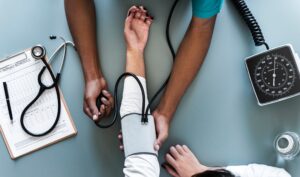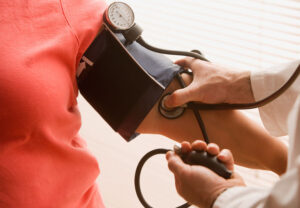The force of blood pressing against the walls of the arteries is known as blood pressure. Blood travels from your heart to various regions of your body via arteries.
During the day, your heart rate rises and falls.
The force of blood pressing against the walls of the arteries is known as blood pressure. Blood travels from your heart to various regions of your body via arteries.
During the day, your heart rate rises and falls.

One of two forms of high blood pressure will be diagnosed by your doctor:
• Primary (also called essential) high blood pressure. Aging and bad behaviors like not getting regular exercise are two of the most prominent causes of this sort of high blood pressure.
• Secondary high blood pressure. Aging and bad behaviors like not getting regular exercise are two of the most prominent causes of this sort of high blood pressure.
Untreated hypertension can lead to several serious health problems, including:
If your heart rate is exceptionally high, you should be aware of the following signs and symptoms:

If you do any of the following, you’re more likely to have high blood pressure:
If you have primary hypertension, you’ll need to keep it under control for the rest of your life.
If you have second hypertension, your heart rate will most likely drop if the medical reason that caused it is addressed. If your high blood pressure was caused by a drug, changing to a different prescription may help you decrease your blood pressure.
Because high blood pressure has no symptoms, your healthcare professional will use a blood pressure monitor to check your blood bp.
Every yearly checkup or appointment, your blood pressure is routinely checked. Your physician may notify you that you have hypertension if you do have high blood pressure measurements at two or more visits.
Changing your lifestyle can help you organize and monitor high blood pressure. Your doctor may advise you to make certain lifestyle modifications, such as:-
The sort of high blood pressure medication your doctor recommends is determined by your blood pressure readings and general health.
In general, using two or more blood pressure drugs is more beneficial than taking just one.
Blood pressure drugs come in a variety of forms, each with its own mechanism of action.
A healthy lifestyle is a primary line of treatment for kids and adolescents with high blood pressure. This includes the following:-
If you experience any of these signs, you should see a doctor as soon as possible. You may be suffering a hypertensive crisis, which might result in a heart attack or stroke. You might potentially be suffering from another major health problem.
Headaches and nosebleeds aren’t necessarily a sign of high blood pressure. When blood pressure is above 180/120, however, this can occur in a hypertensive emergency. If you have these symptoms and your blood pressure is exceedingly high, take a 5-minute break and check again. It’s a medical emergency if your blood pressure remains abnormally high.